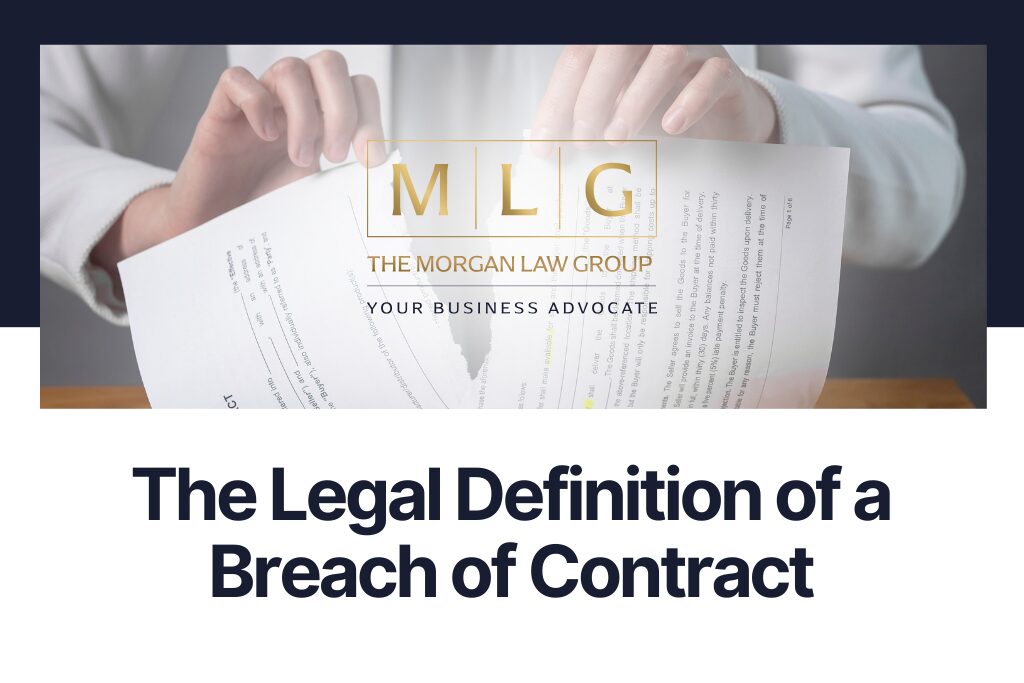A contract is a legally enforceable agreement between two or more parties. It can be written, oral, or implied, and it creates a set of obligations which the involved parties are expected to honor. When these obligations are not met, a breach occurs.
At The Morgan Law Group, our breach of contract lawyers understand the challenges and complexities that come with disputes over breached contracts and are ready to help in resolving breach of contract disputes.
What Is a Breach of Contract?
In contract law, a breach of contract is when one party fails to fulfill their part of the bargain as agreed in a contract. Whether it’s a missed payment, failure to deliver goods or services, or not completing a project on time, these failures can jeopardize a business’s operations and financial health.
Types of Breaches
When entering into contractual agreements, it’s crucial to understand the different types of breaches that can occur, as each requires a distinct legal approach. Here’s a detailed look at each type:
- Material Breach: This is considered one of the most severe types of breaches. A material breach occurs when one party fails to perform a core obligation, which consequently undermines the entire purpose of the contract. For instance, not delivering a key component of a product or failing to provide a service that forms the basis of the agreement qualifies as a material breach.
- Minor Breach: Also known as a partial breach, a minor breach occurs when the failure to meet contractual obligations does not completely derail the intended outcome of the agreement. While this breach does not allow for contract termination, the affected party may still claim damages. These are usually limited to the actual and direct losses associated with the specific terms that were not met.
- Anticipatory Breach: An anticipatory breach happens when one party explicitly informs the other that they will not fulfill future obligations under the contract before they are due to perform. This early warning allows the non-breaching party to seek legal remedies immediately, rather than waiting for the time of performance and then experiencing failure.
- Actual Breach: An actual breach refers to instances where a party fails to fulfill their contractual duties at the time they are due. This can take the form of incomplete performance or a total refusal to uphold their end of the contract. The non-breaching party can seek immediate remedies for any losses incurred as a result of this breach.
Understanding the nuances between these types of breaches helps in effectively managing contractual relationships and preparing for potential legal actions.
Recoverable Damages for a Breach of Contract
In legal disputes involving a breach of contract, various forms of damages can be recovered, depending on the nature of the breach and its impact. Below are the primary types of damages that may be awarded:
- Compensatory Damages: These are intended to compensate the non-breaching party for the loss directly caused by the breach. They are calculated based on the amount necessary to cover the value of the promised performance and to restore the injured party to the position they would have been in had the breach not occurred.
- Consequential Damages: These are awarded in addition to compensatory damages when the losses from the breach extend beyond the immediate scope of the contract. Consequential damages cover losses that the breaching party should have foreseen as a likely result of their failure at the time the contract was made. This might include lost profits or additional operational costs incurred from finding alternative solutions.
- Punitive Damages: While less common in contract law, punitive damages may be considered in cases where the breaching party’s behavior is particularly egregious. These are not intended to compensate the injured party but rather to punish the wrongdoer and deter similar conduct in the future.
- Nominal Damages: Awarded when a legal breach is identified but no actual monetary loss is discernible. These damages are symbolic and typically involve a small financial amount, affirming the wronged party’s complaint without significant economic compensation.
Whether through negotiation or litigation, breach of contract lawyers can help in achieving favorable outcomes that address both immediate and long-term impacts of contractual breaches.
How to Resolve Breach of Contract Disputes
Resolving disputes arising from a breach of contract requires a nuanced understanding of both legal principles and the specific terms of the contract involved. There are various methods to address breach of contract:
- Negotiation: This is often the first step in dispute resolution. Here, both parties engage in discussions to voluntarily adjust their obligations and reach a mutually acceptable solution without the need for further legal action.
- Mediation: When negotiations are unproductive, mediation can be a valuable alternative. In this process, a neutral third party, known as a mediator, facilitates the discussion between the disputing parties. The mediator helps clarify issues, explore potential solutions, and work toward a mutually agreeable settlement.
- Arbitration: Arbitration involves a neutral third party, an arbitrator, who listens to both sides and then makes a binding decision. This method is generally faster and less formal than court proceedings but offers less opportunity for appeal.
- Litigation: When other methods fail or are deemed inappropriate, litigation might be necessary. This involves taking the dispute to court where a judge (and possibly a jury) will hear the case and make a legally binding decision. Litigation can be time-consuming and costly, but it is sometimes required to resolve deeply contentious issues or where significant sums or legal principles are at stake.
Choosing the right method to resolve a breach of contract involves careful consideration of the circumstances, the nature of the breach, the relationship between the parties, and the potential costs involved. If you are facing a breach of contract, it is vital to seek help from breach of contract attorneys immediately. Contact us today or complete our online form to schedule a free consultation.

